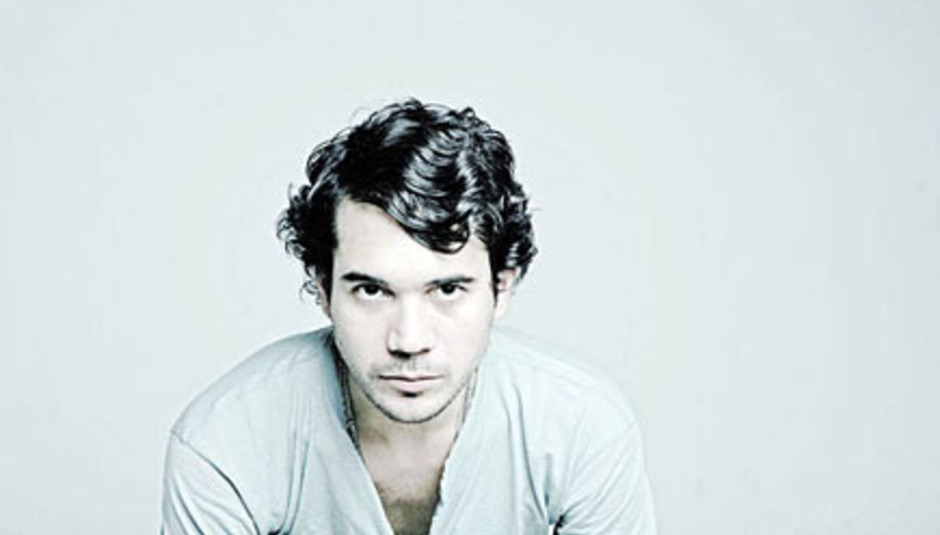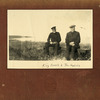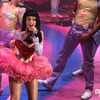Matthew Dear has been making music under various guises since 1999. Born and raised in Texas, Dear moved to Detroit to study in his late teens, initially becoming enraptured by the city's reputable techno house scenes before eventually creating his own variants on the genre. Also an esteemed DJ and producer, Dear is one of the founders of Ghostly International imprint, as well as numerous offshoots most notably Spectral Sound, where his recordings under the alias of Audion have attracted widespread attention to the label.
However, it's under his own name that most of the critical recognition for his work has developed, and with four albums and a string of singles and EPs in his back catalogue, Dear has established himself as a mercurial figure on the underground techno scene.
These days based in New York, his most recent long player Black City cemented his growing reputation even further, DiS writer Si Truss stating it to be _"...really rather loveable, like someone taking all of your favourite Eighties 12-inches, remastering them and making you your own extra special mixtape.".
The past few weeks he's been touring round Europe with his band as special guests of Interpol, and it was at their penultimate UK show in Leeds where DiS caught up with the elegant performer known as Matthew Dear post-soundcheck.
DiS: How's the tour been so far?
Matthew: Pretty good. It's an interesting task to perform in front of someone else's favourite band, but it's also been a great learning experience too, finding out which songs work best in that kind of environment.
DiS: Have you found Interpol's fans to be quite receptive to your music?
Matthew: Yes, absolutely.
DiS: I think there are quite a few similarities between what you both do, certainly in terms of influences at any rate?
Matthew: I think so. It seems like they're doing the rock version of what our influences are, whereas I do the electronic version. I know we share a lot of the same tastes.
DiS: I can also hear a lot of parallels in both yours and Interpol's lyrics, particularly the dark perspective from which you both seem to write.
Matthew: It's difficult to say I guess. I mean, that would be a question for Paul Banks as well. Mine's very personal and very twisted at times, so I'm not sure whether he'd call Interpol's the same...
DiS: Would you say UK audiences are more accustomed to your work as an artist and performer or as a DJ?
Matthew: I've had some of my best shows over here, particularly in London, so I'd say they're pretty accustomed to the idea of electronics in general. There's a massive dance culture that seems to have stuck from the days of the early acid house and rave scene so for someone like me, it means I can enjoy the best of both worlds whether I play a DJ or full band set in the UK.
DiS: How did the shows with Interpol come about? I guess it must have been an easy decision to accept the offer to go on tour with them.
Matthew: Oh absolutely! I was literally jumping at being given the opportunity to play to sold out crowds in large venues for a month.
DiS: Your most recent album Black City seems to have brought you to the attention of a wider audience as well as amassing a fair amount of critical acclaim too. Were there any expectations for the record upon its release?
Matthew: No, it's never a goal of mine but it is desired and appreciated. I am only too happy that more people want to hear my music, but the actual process of writing hasn't changed as part of that.
DiS: It's probably fair to call Black City a concept album of sorts. What influenced your decision to write about connected themes throughout the record?
Matthew: To be honest with you it wasn't set out to be a concept album really. Conceptually it fits together because the stories are basically narratives of my life at that time. It's more about a mood and I guess it's an afterthought when I listen to it now that a lot of the same themes were prevalent in my life and coming to a close during 2010. Wars, the economy, everything was pretty intense and I think Black City reflects a lot of that without being a calculated record.
DiS: Some of the themes aren't that obvious at first, but it sort of becomes more apparent with every listen, which I guess is one of the reasons why Black City has grown in popularity since its initial release.
Matthew: A lot of people have said that to me, and I really appreciate that. My main aim when I'm creating music is for it to be listened to over and over again and I think if you can do that with density and ambiguous narratives it can mean so many different things and I like listeners to be able to interpret their own message, so yeah...
DiS: In terms of the songwriting and arrangement process, are you fully responsible for everything or do your band members contribute?
Matthew: I do everything. The band just comes on for the live experience. Everything is recorded in my studio in New York.
DiS: How do you rehearse and plan your live sets with the band and what they bring to the shows?
Matthew: It changes everything. I give them free reign when we start rehearsing. Usually they hear the songs as I'm making them and then I give them a copy of the album as soon as it's finished, and then we begin rehearsing. There's never any live instruments in the studio so they have the option to get creative and write drum lines and bass parts and trumpet segments, which there wasn't any of on the record, so it's quite an open ended process and because I don't play a lot of these instruments I need them to bring their knowledge for the whole live experience to work. It almost becomes like a new version of the album, only live.
DiS: In terms of your live set, is it currently exclusively material from Black City or will it encompass your entire back catalogue?
Matthew: On this tour we're doing 'Tide' from Backstroke and 'Fleece On Brain' from Asa Breed with the rest of the set primarily taken from Black City. In our normal set, which usually lasts about an hour and a half we do quite a few more older songs.
DiS: Ghostly International, the label which you partly set up in 1999, has established itself over time as a standard bearer for experimental techno in the same way Warp did a decade or so earlier. Did you expect the label to become so successful or even still exist twelve years later?
Matthew: Yes, we wanted that to happen. We wanted the label to be recognised on a par with the likes of Warp and 4AD. We never thought that we were as good as that. For us it's never about feeling that we've finally made anything. We absolutely believe in our work but nothing's finished, we've never reached an end point. We still analyse those other labels and the legacies they've left, so we can only be honoured to try and hit that mark.
DiS: I think more and more people are becoming more familiar with the depth of creativity within the electronic scene at the minute. Even with your label, the Shigeto album Full Circle was one of my favourite records of 2010 for example.
Matthew: It's always been a vibrant area of music and I think it's getting more and more fine tuned. There's better software available now, and people seem to be focusing on better sound quality too. It's a good time to be involved, a really good time...
DiS: You've released a lot of records under various guises and aliases over the years such as Audion and Jabberjaw as well as yourself. Which one do you feel most comfortable with and why?
Matthew: Right now I'm most comfortable with the music I'm making under my own name. I think that's just become the most honest and natural. Audion right now is on the back burner. I want to return to it but...I read a lot about the last interview that Dennis Hopper did for Rolling Stone just before he died, and he said that we used to quit doing everything else and just focus on one trait. He was an actor, a writer and he had several other things going on as well, but he would never cross-pollinate. Once he made the decision to go with one he'd stick with it until the job was done, and I think I'm finding myself doing that more now, with the music at least. I'm realising that it's really hard to give Audion 110% when I'm touring with the band, so I think for the sake of the music I've pulled back, but I am foreseeing a return to Audion at some point because I do get anxious for it after a while.
DiS: Do you have any other projects lined up for the future which might veer away even further from where you've already ventured?
Matthew: I've threatened to make an acoustic record, and I've also thought about making a noise album as well. They are two of my goals. Music making for me is about experimentation and by attempting other styles of production and songwriting I tend to learn more about the overall process as well as get my rocks off in different areas of music production.
DiS: You've just mentioned noise and acoustic as being two areas you plan to diversify your sound towards in the future. Which of your labels would you put those records out on, Ghostly International or Spectral Sound?
Matthew: The beauty of Ghostly International is that as a label there are no musical boundaries as such, and everything is so open ended, so naturally it would be on Ghostly. With Spectral Sound, we wanted to keep that strictly dancefloor based. It's our DJ outlet, and I see that as how we connect with the more club-based side of what we do.
DiS: You've moved around a lot over the course of your life from Texas to Detroit and now New York. Have such changes of environment reflected themselves in your music and influenced the way you write?
Matthew: Absolutely. Detroit I think was where I learned a lot of the basics and it allowed me to be totally free in terms of the attitudes within that city and the process of writing. New York is way more confined and you have to be more considerate of your surroundings, your neighbours in terms of volume etc, so I think it's a lot more pulled back in the ways that I write and fine tune things. I tend to focus more on the precision element of it, so each environment totally influences my approach to writing and the whole creative process.
DiS: Let's turn your change of surroundings on its head and imagine you started in New York and ended up in Texas. If that had been the case do think your musical journey would have taken an entirely different direction?
Matthew: Without a doubt. I think growing up in Texas gave me a bit more of the rock mindset first, and then moving to Detroit totally changed everything and gave me a better understanding of hip hop and techno. All of the late night radio stations there play ghettotech and house music, which you don't have in Texas.
DiS: You've been known to remix other people's work, and also have DJs and producers do the same with your material - the Sascha Dive mix of 'Little People' off Black City is one example which springs to mind where the new version is quite radical in comparison to the original. Has there ever been a time where you've either turned a request down to remix another artist's work, or even had someone come to you with a version of one of your songs which you've stopped them from putting out?
Matthew: Sascha (Dive) approached me at an event in Munich and said he loved the song and would love to remix it. That was a rare moment where somebody comes out of the blue and asks to remix one of my songs, and I get quite flattered by things like that so I told him to make it happen and do whatever you want, make it as long as you want, and he definitely took me up on that! There's two versions, one that approaches fifteen minutes, and a longer one which stretches to around twenty. Sometimes you get asked by certain people to remix their songs and either there's not enough time or you really can't get your head around the project. I do tend to only remix artists who are acquaintances I've made along the way, people I communicate with naturally and feel I've made a connection with. Sometimes it doesn't work out, but most of the time it does.
DiS: You've mentioned your admiration for Brian Eno in several previous interviews. Do you see your own career progressing in a similar trajectory to his in that you tend to combine your work as a musician, performer, DJ and producer all at the same time?
Matthew: I don't know. I mean, there are probably hundreds of people out there who are doing a similar thing, or combining a similar lifestyle right now. I guess Brian Eno was ahead of the curve in terms of the traits he decided to take on at that time. I think it's pretty natural now for artists to combine so many different methods. I am a huge fan of his work and I do feel I've learned something just by hearing it, and I would love to emulate a lot of what he's done in terms of working with bands and producing records.
DiS: I guess I'll have to put you on the spot. Do you consider yourself to be a musician, performer, DJ or producer first and foremost?
Matthew: First? A producer, hands down. That's where the most control is, that's where I feel my artistic statement is made. Every little bit of sound that ends up on a record is there for a reason, and it's in that kind of environment where you're in control of it. Playing live with the band or DJing in a club is about taking music out to other people, and it's a gratifying experience to see others getting off on what I do, but it's not really about yourself, whereas producing a record is like documenting an expression of art.
DiS: Tomorrow is the final night of the tour. What does the rest of 2011 have in store for Matthew Dear?
Matthew: Lots of festivals, especially in the UK and Europe. I think the next one I'm scheduled to play is Primavera. After that I'll be wrapping up the next album which should hopefully be out by the end of the year.
DiS: Is it all recorded and ready to go?
Matthew: Pretty much. There's lots of recordings and similar stuff to what's on Black City left over from those sessions as well as some new material we've been working on. We haven't got a title for the record yet, but as soon as we do you'll be the first to know!
For more information on Matthew Dear visit his official website.






















